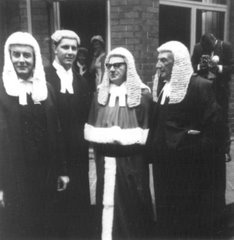Didn't some great critic or sage once say that the worst part of every great novel was its ending? That it's impossible, and artificial, to depart so abruptly from a rich world that has just been created? Or something like that. Maybe so, but here are 10 of my favorite such departures--and perhaps the best rebuttal to the 'anti-ending' argument I could come up with...
(Note: I'm using a liberal definition of "ending"--I don't just mean the final page or chapter necessarily, but the way the author takes leave of the larger universe of the novel. Although a smashing final page or line doesn't hurt, either.)
10. John O'Hara, Appointment In Samarra. O'Hara's hero, Julian English, completes his self-destruction in the final chapter. After mixing a highball drink in an enormous flower vase, he lurches into the garage and poisons himself with CO2 -- while semi-consciously regretting his actions the entire time. Has to be one of the best and most sensitive suicide scenes in literature.
9. Frank Norris, McTeague. It's impossible to render the context for this one fairly, but suffice it to say it involves a man handcuffed to the corpse of his former best friend, dying of thirst in the middle of Death Valley. Hard to beat for pure brutality, anyway.
8. Thomas Hardy, Tess of the D'urbervilles. Hardy wrote a lot of great endings, and I was tempted to go for the near-triple drowning in Return of the Native... but nothing beats Stonehenge (yes, that counts as part of the ending sequence). I guess it's probably inevitable that a best-endings-of-all-time list would have considerable overlap with a favorite-books-of-all-time list.
7. Martin Amis, Time's Arrow. I read this thinking it was more or less an exercise in cheerful gimmickry. The ending (or the last quarter or so of the book) got me pretty good. Back, back, into the darkness.
6. Jane Austen, Persuasion. Gut-punch tragedies have a natural advantage over happy endings, but there should be at least one place on here for a brisk, beautifully executed triumph.
5. Kazuo Ishiguro, Remains of the Day. The suffocating melancholy here is a nice contrast against the special-effects melodrama of Samarra and McTeague. As I think we discussed in the "saddest books" list, sad doesn't have to be showy.
4. F. Scott Fitzgerald, The Great Gatsby. The most famous ending in American literature? (The "boats against the current" bit made it onto season 2 of The Wire). It deserves the hype.
3. Edith Wharton, The Age of Innocence. Quietly crushing, like the Ishiguro, but even a bit better.
2. Vladmir Nabokov, Lolita. Amid the hilarity and perversity and the virtuosity, people forget that this thing is a real heartbreaker at the end. Humbert's last visit with Dolly is gorgeously wrought, as is his final, misty-eyed ramble through the countryside.
1. William Faulkner, Absalom, Absalom. Beyond everything else, Faulkner practically squeezes the tragedy of the Sutpens, the Compsons, and American history into just a few lines:
"...Now I want you to tell me just one thing more. Why do you hate the South?"
" 'I don't hate it,' he said. I dont hate it he thought, panting the cold air, the iron New England dark: I dont. I dont! I dont hate it! I dont hate it!"
Monday, December 10, 2007
Subscribe to:
Post Comments (Atom)

3 comments:
Sadly, I've only read Gatsby, Lolita, and Persuasion of those. This post inspires me to try Absalom, Absalom!, though.
I remember reading somewhere that Austen actually died before she put the finishing touches on Persuasion, which might be the reason for its rather abrupt but strangely beautiful conclusion, which I actually like better than the somewhat pointless scenes of couples happiness that end some of her others book (P&P in particular).
As for wonderful endings, I've always loved the last paragraph of James Salter's "A Sport and a Pastime," which I realized later I had almost memorized after just a single read.
As for Anne-Marie, she lives in Troyes now, or did. She is married. I suppose there are children. They walk together on Sundays, the sunlight falling upon them. They visit friends, talk, go home in the evenings, deep in the life we all agree is so greatly to be desired.
I was thinking of Barney's Version, by Mordecai Richler. The narrator is descending into the grips of Alzheimer's disease, clearly losing his ability to keep writing cohesively but, conscious of this, racing to make amends.
The final chapter has a frenetic pace which is is offset by a 30 or so page epilogue, written by the son/editor of the memoirist, which has a very nice calming, declining effect.
Post a Comment